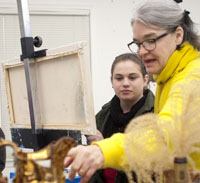Why I Give: A Q&A With Kathleen (Bunny) Willis Webb ’52

Kathleen (Bunny) Willis Webb
Tell us a little about yourself.
I am an Army brat, born at West Point, and moved with my father’s career and then with my VMI engineer husband’s Army and railroad careers. I came to Randolph in 1948. Not happy with my college acceptances, I applied late at the suggestion of my high school English teacher. Rooms were in short supply in 1948 due to a large freshman enrollment, and I ended up in an old piano practice room called “Back of Rec.” This was an unfinished area above the then Main dining room, which had been the original chapel and is now the wonderfully refinished wing housing the Skeller, choice rooms, offices, and the exercise rooms with their glorious views of the mountains. After a month there, a place opened in Webb because Lucy Foard McCarl’s ’52 roommate was discovered to have tuberculosis. I moved, and I think I’m the only person from those little, dark rooms who stayed after that first year. (Tuition, room, and board were $1,200 that year and remained the same for my four years—an astounding statement.)
What do you think of the College today?
The College was the same warm, welcoming place then that it is now, and the faculty were excellent and very supportive, though the many supports offered now are far more structured and available. Traditions have changed. There are no sororities and probably no secret societies with their stomps—or, at least, not so many. I remember Odds and Evens, but there was no Pumpkin Parade or Daisy Chain. The Honor Code was important to me then and is now. I was raised on “Duty, Honor, Country.”
Tell us about your life after graduation?
My summer jobs while in college were not internships. I was lucky to get typing jobs at the Pentagon courtesy of my father. And the wonderful $600 three-week YWCA European trip that several of my classmates were able to take just after graduation was out of the question. My brother was in college too. After graduation, I went to New York and worked at Doubleday publishers as a secretary (bad typist) in sales for a year. Opportunities for young women in the early fifties (and later) were limited, especially at a time when young men had returned from war and filled most of the openings. One woman I know, with strong bookkeeping and an early MBA, was bluntly told she should find herself a young man and make babies. I was lucky to be able to stay home with my daughter until she went to school. I returned to school to train as a librarian and became an early electronic school librarian and am still a librarian in my current retirement home.
Why did you choose to help fund internships and research with your gift?
Today’s job market offers so many more options than I could possibly have envisioned and many internships of quality—though paid internships are few. I have made my gift to the College so students who need financial aid can explore career opportunities in ways I could not have imagined—and take advantage of every future opportunity that comes along during their lives.
Why is it important to give back to the College?
My gift reflects my need to pay the College forward as thanks for teaching me to think and giving me four not perfect but wonderful years. The size of gifts is important but the number of alumnae and alumni giving is just as important to foundations and other sources of large gifts. Even $1 adds another person to the number, and don’t let the smallness of a gift embarrass you. It is important.
To learn more about ways to give, please contact The Planned Giving Office at 434-485-8050 or plannedgiving@randolphcollege.edu.

